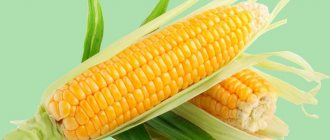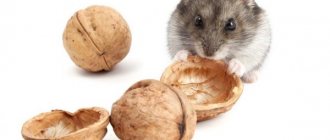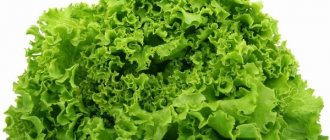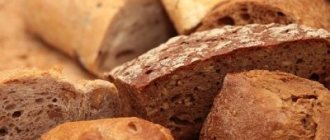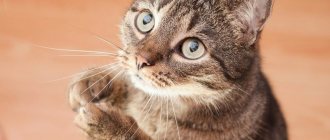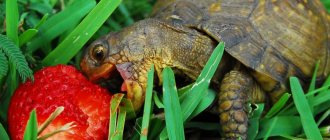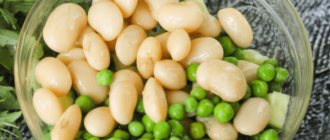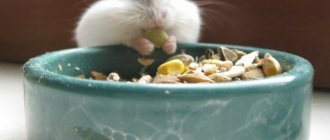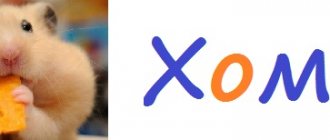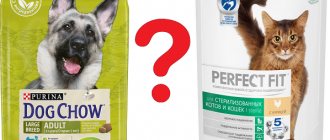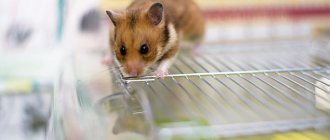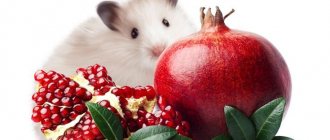Do they give cheese to hamsters?
The diet of both domestic and wild hamsters is not limited to cereals, vegetables and fruits. The diet of such animals must certainly include protein foods. When asked whether hamsters can have cheese, not even all experienced livestock breeders can give a competent and unambiguous answer. But this product is a valuable source of protein. Today we will answer this question. You will also find out if hamsters eat cheese.
The main part of the diet of Djungarian hamsters.
- For the Djungarian hamster, the main food is dry food mixture. Ready-made commercial food for hamsters can be purchased at a pet store. Ready-made feeds are produced in the form of granules and grain mixtures, which consist of grains, seeds, and pieces of ground corn. Food in the form of granules allows the hamster to chew on them, and this is useful for dental hygiene. It is better to buy ready-made food in moisture-proof packaging so that dried vegetables and grains are well preserved and do not become moldy.
- Cereals that can be given to a Djungarian hamster:
- wheat;
- oats;
- beans;
- buckwheat;
- Hercules;
- peas;
- beans;
- barley;
- lentils.
- Seeds:
- pumpkin;
- sunflower;
- melon
- Sometimes you can pamper your pet with nuts:
When purchasing ready-made food, pay attention to the number of sunflower seeds in the total mass. Manufacturers often add them in excess, and this has a bad effect on the health of hamsters.
- walnut;
- cashew nuts;
- peanut;
- sesame (seeds);
- hazelnut
An excellent natural source of fiber is timothy and alfalfa hay. You can give your hamster sprouts of alfalfa, wheat, oats, millet, they can be sprouted on the windowsill and these nutritious grain crops can be given as greens, especially in winter.
- Hamsters are given greens in small quantities:
- yellow clover leaves;
- dandelion leaves;
- plantain leaves;
- nettle leaves;
- parsley leaves;
- lettuce leaves;
- dill.
Any greenery absorbs various substances from the air and soil well, so it is very important that it is grown not near the city or highways, but in environmentally friendly conditions.
- The diet of small rodents should also include fresh vegetables:
- cucumber;
- zucchini;
- pumpkin;
- carrot;
- radish;
- cauliflower;
- zucchini;
- eggplant;
- fresh corn;
- Chinese cabbage.
Introduce fruits and vegetables into your hamster's diet gradually, starting with one small piece of a particular vegetable or fruit per week to reduce the likelihood of diarrhea. Vegetables and fruits should be thoroughly washed. Do not forget to remove seeds from fruits and berries before giving them to your Djungarian hamster.
- A hamster's cage must have branches on which the animals sharpen their teeth. These are branches of deciduous and fruit trees:
- birch;
- beech;
- cherry;
- pear;
- poplar;
- Apple tree;
- maple.
You should not pick branches from trees that grow along roadways - they can be toxic. Before giving the sticks to rodents, they need to be boiled for an hour and dried.
- Djungarian hamsters should eat protein foods several times a week:
- boiled chicken or quail egg;
- chicken meat (boiled without salt and spices);
- yogurt without additives and sugar (no more than 1% fat);
- kefir and cottage cheese (no more than 1% fat).
Protein is a very important nutrient for Djungarian hamsters. Fresh, unprocessed sunflower, flax and sesame seeds, as well as lentils, are rich in protein. Once a week, to strengthen the immune system, hamsters can be given small portions of low-fat cottage cheese.
- For feeding newborn dwarfs:
- meat or vegetable baby food (without additives, salt, sugar and soy);
- cereals soaked in water;
- dairy-free porridge (no salt or soy);
- boiled rice
Chocolate contains a substance called theobromine, which can adversely affect the cardiovascular system of the Djungarian hamster.
Citrus fruits (lemon, orange, grapefruit) are high in vitamins and can cause hypervitaminosis in a hamster.
Watermelons and melons may contain pesticides and chemicals, and this threatens to poison the hamster.
Cabbage (white cabbage, Brussels sprouts, red cabbage) can cause gas and bloating in the hamster's intestines, which can lead to the death of the animal.
- Water is as important to hamsters as food. There must be fresh water in the cage at all times. You should not give them boiled or distilled water; it is better to give hamsters filtered or spring water. For your beloved pets, you need to purchase a drinking bowl with a spout from a pet store.
- Vitamin-calcium supplements should also be present in the diet of Djungarian hamsters. Some manufacturers of dry food immediately put vitamin supplements in them, but on store shelves you can find sets of special vitamins for rodents.
Most foods contain various additives that can be toxic after the expiration date, so do not use expired hamster food.
The health and life expectancy of Djungarian hamsters depends on how well the diet for small rodents is prepared.
In order for the Djungarian hamster to avoid all diseases, it needs to be provided with proper nutrition. Today we will talk about what to feed a Djungarian hamster and how to organize feeding of your furry pet.
Djungarian hamster food
Cheese composition
Several products are used to make cheese - whole milk, sourdough and a special substance obtained from veal stomachs.
In addition to the main components, salt and other auxiliary components are used in the cheese making process - potassium nitrate, calcium chloride.
This list of ingredients in the manufacture of a dairy product is established by GOST. Today, unfortunately, the quality of such products has decreased significantly. Finding a finished product with such a composition is quite difficult. Most manufacturers use various additives, flavors and dyes, which can cause severe allergies and disruption of the gastrointestinal tract in a small rodent.
Useful properties of the product
When a hamster eats cheese, its body receives many beneficial substances:
- Protein is a vital component. It is a building material for cells and helps build muscle mass.
- Amino acids, which are contained in high-quality cheeses, increase the tiny body’s resistance to various infections (viral, bacterial and fungal). In addition, organic compounds are involved in metabolic processes and fermentation processes.
- Cheeses are rich in vitamins B, A, D. These beneficial components help improve immunity, normalize the functioning of the cardiovascular system and have a beneficial effect on the visual organs.
- The dairy product contains vital microelements - phosphorus, magnesium, calcium and potassium. These substances prevent the development of tumors, tone the muscular system and normalize the functioning of the nervous system.
So, if your pet enjoys eating such a treat, you should choose the safest and healthiest variety for him.
Features of feeding
We have already figured out that hamsters eat cheese and this product is not contraindicated for them. Now, let's find out how often and in what portions he eats such food.
Since such a product does not form the basis of a pet rodent’s diet, there is no need to give it too often. 2-3 times a week is enough. To avoid getting confused yourself, mark protein days on the calendar, for example, Monday and Wednesday. This way you can avoid problems with oversaturation of a small organism with such food.
A single serving should be the size of a sunflower seed. To start, give your rodent half the portion. Observe his condition. If the body accepts such food normally, the portion can be increased.
At what age can you give cheese to a hamster? So, the age of a hamster that can try such a treat for the first time should not be less than six months.
What foods should form the basis of a hamster's diet?
The basis of the Djungarian hamster's diet is a mixture that includes legumes, cereals, and cereals. You can make this mixture yourself, or you can buy it at a pet store. But, experts recommend feeding furry pets with a ready-made mixture. Food for your Djungarian hamster should be purchased in a specialized store, where you get a guaranteed quality product.
As a rule, ready-made food consists of seeds, corn, oats, rolled oats, nuts and peas. Manufacturers offer several types of mixtures for hamsters. They differ in the components they contain and the quantitative indicators of each component. Some mixtures have more nuts, while others have more seeds.
When preparing feed mixtures at home, you can additionally add beans, barley, lentils or buckwheat. All these products are to the taste of omnivorous hamsters and do not harm their health. You can add sesame seeds and cashew nuts in small quantities.
Catering
You should not feed your pet as many times as he wants. It is enough to fill the feeder 2-3 times a day. After each feeding, we remove the remaining food from the feeder and wash the feeder. Pregnant Djungarians are fed 3-4 times a day. Create a feeding schedule and give food at the same time. We carefully introduce new foods into the diet.
The basis for feeding dzhungarika at home should be the following products:
- food for little fluffies, sold in specialized stores;
- a mixture of grains selected independently. These are oats, rye, barley, corn and wheat grains;
- hamsters love sunflower seeds, ripe pumpkin and flax seeds, walnuts, cashews, peanuts and hazelnuts;
- mineral stone for grinding down incisors and improving digestion and branches of garden trees. You can use twigs of cherry, pear or apple trees. Maple, oak and poplar twigs are also useful, as they clean the hamsters’ teeth and saturate the body with nutrients. Before giving fresh branches to the rodent, it is recommended to treat them with boiling water;
- in the summer, Dzhungriks enjoy eating greens, in particular, table lettuce, dill, parsley, dandelion flowers and leaves, clover and plantain;
- clean water, which should be constantly available.
In addition, every other day, hamsters should be given vegetables - broccoli, carrots, pumpkin, tominambur, zucchini. Allowed vegetables should be prepared in pieces no larger than 1 cm.
As for fruits and berries, the frequency of treating them is once every 6-7 days. Among the permitted fruits and berries are apples, pears, bananas, raspberries, currants, rose hips, rowan, and sea buckthorn. All seeds should be removed from fruits and berries - children can choke on them.
It is also advisable to give your hamsters vegetables, fruits and berries grown in home gardens. The varieties sold in supermarkets are often poisoned with large amounts of pesticides, which is dangerous for the small organism.
In summer you can stock up on dried fruits: apples, pears, rowan berries and rose hips. Caring owners also freeze fresh vegetables and berries for their pets. Natural vitamins will be very useful for dzhungarikas in winter.
Protein food - after about 2-3 days, it is necessary to supplement the diet of the Djungarians with protein food, for example, low-fat cottage cheese, boiled chicken or quail eggs, lean pieces of boiled beef, turkey or rabbit meat.
Another important recommendation is that there should be no uneaten pieces left in the baby’s cage, which quickly deteriorate (especially in the summer) and become potential sources of poisoning.
| Category | Prohibited | Conditionally allowed |
| Cereals | Pasta, bread, sweet pastries | Rice, buckwheat and lentils |
| Seeds and nuts | Almonds, cherry pits or apricots, chestnuts and acorns | |
| Vegetables | Melons, potatoes, white cabbage | Tomatoes, cucumbers, cauliflower, celery |
| Fruits | Citrus or exotic types of fruits | Plum, peach, apricot |
| Protein food | Any raw meat, raw fish, cheese, sausage | Boiled lean fish, boiled shrimp and mushrooms |
The food offered should not be sweet, salty, fatty or fried. Many types of such products can cause allergies, diarrhea or constipation, as well as irreversibly damage the liver.
Hamsters should not eat confectionery or foods with spices. It is important to remember that forbidden food can be dangerous for your pet!
Can hamsters have cheese? Do dwarfs eat it?
Many people have long had the wrong idea about the relationship of rodents to cheese. A lot of information remains in our heads from watching cartoons. For example, "Tom and Jerry", where Jerry the mouse was constantly hunting for cheese. He always managed to outwit Tom the cat and get the coveted piece. This is one of the cartoons that sowed into our consciousness the wrong attitude of rodents towards cheese. In fact, even that same mouse treats cheese the same way it treats other products. What about our rodent? Can a hamster have cheese?
Cheese is not a product that can be given to a hamster often. Don't forget that it is fatty and salty. But your pet should not eat such foods. It also contains spices that a small body cannot digest. But why then do hamsters always eat it? The hamster himself does not know what is harmful to him and what is not. In the wild there is not such a variety of food as at home. There are no pickled cucumbers lying around there or dishes prepared according to recipes with the addition of various spices and salts. Therefore, this product is not recommended for animals. It is advisable that every pet owner knows what hamsters should not eat.
Which milk should I give to whom?
Milk is a liquid rich in vitamins A, B, B12, proteins and amino acids.
Hamsters are mammals that feed on their mother's milk until they are one month old. The natural drink is beneficial for their growth and development. The female's mammary glands produce enough fluid to feed the offspring. When the animals grow up, there is no need for breastfeeding.
At home, the drink can be given:
- Children left without a mother. The natural product is too heavy for the animal’s stomach. It is better to consult a veterinarian and purchase formula for feeding.
- For a lactating or pregnant female, no more than once a week. The drink is beneficial for both mother and cubs. When hamsters stop eating milk, it is removed from the mother's diet.
- Sick individuals. To restore your hamster's body after an illness, give it a milk drink.
It is not necessary to give milk to adult, healthy rodents. A sufficient amount of fluid enters the body with water and succulent food. If you decide to add this product to your diet, please note:
- For fat content. It should be no more than 1.5%.
- Looks like milk. Goat milk contains fats that are harmful to the body of the dwarf. Offer your pet cow's milk, slightly diluted with water. The lighter the food, the better.
- On the method of feeding. First boil the milk and then cool it. You can dip a piece of black bread into the liquid and give it to your pet.
Only low-fat milk in small quantities is beneficial for the animal’s body. Consult your veterinarian before including it in your diet.
Is it possible to give Djungarian hamsters cheese?
It is worth mentioning separately about dzhungarikas, since they are the most popular species among domestic hamsters. Probably everyone has noticed the curiosity and appetites that are characteristic of the Djungarians. If he doesn’t eat, he takes a bite. But just like others, he should not be given a lot of cheese. You need to be careful in dosages so as not to cause harm. This product is harmful even to the Syrian hamster, which is the largest of the domestic hamsters.
Can hamsters be given cheese? Yes, just not salty and not fatty and with virtually no additional spices. Few people buy this variety for themselves, so most likely the cheese you have may not be suitable for a hamster.
Can hamsters have cheese?
Thanks to fairy tales, there is a stereotype that rodents are crazy about this delicacy, and the dairy product is an indispensable basis of their daily diet. Is this a myth or not? What does a little rodent really like?
Due to the fact that many consider exclusively dairy products to be the main component of a healthy diet, they transfer this scheme to their pets and feed them foods that are completely unsuitable for them. Hamsters are no exception. Undoubtedly, there are advantages to the cheese diet, but there are many more disadvantages.
Harmful and beneficial components
So what are the harmful and beneficial components of this dairy diet? Of course, hamsters are mammals, but this is not a reason to feed them cheese. First, you need to understand the cooking technology, and indeed whether hamsters can have cheese. For sourdough, as a rule, rennet elements are used; if all technologies are followed, a very fatty variety is obtained. Fat is harmful to a hamster. Still, his daily natural diet is cereals. And cheese is just an infrequent delicacy. After all, a hamster is a rodent, and it needs to chew cereals, fresh vegetables and fruits. Their stomach is not designed for daily digestion of cooked and dairy products, including cheeses.
What foods should form the basis of a hamster's diet?
Food for Djungarian hamsters, due to the fact that they eat almost everything, is not difficult to prepare. But some foods are contraindicated for these small animals. Let's consider what you can feed Djungarian hamsters, in addition to ready-made mixtures.
The diet should contain vitamins. The pet gets them from fruits and vegetables. It is also worth giving the dwarf greens. Plant a bed of clover at your dacha, which has many beneficial properties. In addition to clover, pamper your pet with young plantain leaves and parsley. You can add dill to your diet. But it is not recommended to give greens that have been treated with pesticides to pets.
For vegetables, give preference to bell peppers, cauliflower and broccoli, carrots, pumpkin, cucumbers and tomatoes. If there are no legumes in the feed mixture, then additionally provide peas, corn and beans.
Hamsters need eggs
You need to be very careful with fruits. We give them in small quantities. We give preference to those fruits that grow in our region: apples, plums, apricots, grapes. You can include bananas in your Djungarian hamster's diet. But, since they contain starch, they are considered foods that are difficult for the gastrointestinal tract.
Protein food
When considering what you can feed Djungarian hamsters, you cannot ignore the protein food they need. The diet should include boiled chicken meat. When cooking meat, do not add any seasonings, including salt. In addition to meat, it is allowed to give shrimp to your pets, after first cleaning them from the shell and removing the head.
A boiled egg, rich in protein, can be given extremely rarely. It is better to give preference to quail eggs. You should not pamper your Djungarian hamster with dairy products. Occasionally you can give a little low-fat kefir.
A variety of nuts must be present in your diet. In addition, hamsters love them very much. So, for example, peanuts are a favorite treat for hamsters. But Djungarians should not be given fried or salted nuts.
Despite the fact that the dwarf is an omnivore, there are foods that should not be fed to it. Let's look at the list of prohibited products by group.
Not everything can be included in the diet
White cabbage provokes health problems. Cases have been recorded where this product caused the death of dwarf birds. Kaputa should not be given to pets even after heat treatment.
Potatoes in general are not on the list of prohibited foods. But due to its high starch content, it is a heavy product. Therefore, it should be excluded from the diet.
You still can’t feed little dwarfs with onions.
Fruits
It is also strictly forbidden to give cherry and apricot pits to Djungarian hamsters.
It’s worth mentioning separately about melon and watermelon, which caring owners sometimes pamper the Dzungarians with. These products contain a lot of sucrose, which provokes diabetes in Djungarians prone to this disease.
Sweets
There is no place for chocolate, sugar and flour liver in the diet of Djungarian hamsters. You can add a small amount of honey when preparing delicacies for dzungarians at home, the recipes for which we will consider later.
Dairy
In general, it is best to exclude all dairy products from your pet’s diet. But, if there is no strict taboo on kefir, then giving milk and cheese is strictly prohibited. Another taboo applies to sour cream.
Other
We exclude from the diet any spices, garlic, mint, sorrel, sausages, bread, pasta. As for nuts, the only taboo is on almonds.
Controversial products include radishes and beets. Some experts claim that these vegetables are not harmful for dzungarians, while others categorically do not recommend giving them to their pets. Ultimately, it is up to the owner to decide which foods to include in a pet's diet and which not. But there are so many permitted foods that you can refuse controversial fruits and vegetables.
What kind of cheese should you not feed?
Cheese is allowed to be given to hamsters in small quantities. After all, it contains the protein necessary for the animal. To understand whether hamsters can eat cheese or not, it is important to understand the fat content of the product. If it has a high percentage of fat, then it is recommended to give the hamster a piece no larger than a pumpkin seed. You cannot feed cheese flavored with pepper, spices or any other seasonings. It is forbidden to give a product with a high salt content.
The best cheese for complementary feeding
When the owner finally decides to introduce this product into the hamster’s diet, he must clearly know whether hamsters eat cheese, remember how much and when he spoiled the rodent with this delicacy. It is recommended to give complementary foods once a week. This portion will be beneficial. It will contain all the necessary protein norm. Try to give only natural cheese to Syrian hamsters, without palm oil.
Be sure to monitor your pet after receiving such complementary foods. Allergies (itching, nasal discharge, eye inflammation, changes in coat), indigestion, diarrhea, decreased activity and loss of appetite may occur. Poisoning is also possible; some components may be toxic and cause convulsions, vomiting, and loss of appetite. If you feed Djungarian hamsters cheese constantly, the increased fat content in it will make the animal’s urine more alkaline, and this is fraught with consequences such as damage to the kidneys and bladder.
What can you give?
Hamsters can easily eat oats. But they eat rice only in limited quantities. Corn, wheat, rye and barley can be given without a doubt. But buckwheat and lentils can be used only in small quantities. As for berries and fruits, they can be given both fresh and dried.
All fresh fruits are cleaned of seeds and seeds in advance. Without these components, such food does not pose any danger. It is worth considering that the bulk of juicy fruits are rich in carbohydrates and glucose. Therefore, a strict limitation is imposed on the quantity of such ingredients.
Their maximum share in the daily menu should not exceed 5%. Otherwise, the hamster's life is at risk. Fruits and berries are accumulated in advance. Both dried and frozen preparations are suitable. Dried fruits (bananas, dried apricots, raisins, dates) are soaked for 3 or 4 hours before being placed in the feeder.
Juicy food of any type must be thoroughly washed. In addition, we must try to remove as much pesticides and nitrates as possible. To do this, you will have to soak the greens and peel the apples. Djungarians love:
- oatmeal;
- buckwheat;
- barley;
- oats;
- beans;
- sunflower seeds;
- pumpkin and melon seeds;
- Walnut;
- peanuts and hazelnuts;
- sprouted wheat;
- sprouted oats;
- cashew nuts.
It is quite reasonable to feed Djungarian hamsters with sprouted alfalfa. Recommended green plants include nettle leaves, clover, basil, and celery. It is appropriate to use dill and pea pods in their entirety. Vegetables such as:
- broccoli;
- cucumber;
- carrot;
- cauliflower;
- tomato;
- turnip;
- beet;
- pumpkin;
- radishes and other crops.
Good berry and fruit crops include plums, peaches, pears, cherries, gooseberries, grapes, cherries, and rose hips. Both blueberries and apricots go quite well. A hamster's teeth are strong enough for the animal to eat small twigs and bark of deciduous and fruit crops. The main “candidates”: cherry, apple, poplar and maple.
Beech, willow and birch twigs, pieces of the bark of these trees are also suitable for rodent food. He will be able to sharpen his teeth on such solid food.
Protein dishes should be added to the hamster’s diet every 2-3 days. The best options: boiled chicken, boiled eggs (quail eggs are also acceptable), worms from a pet store or dug up yourself, shrimp. Some hamster breeders use yogurt (only without any additives) and low-fat varieties of cottage cheese.
Alfalfa and timothy will provide hay for your hamster. Such food will provide the animal with plant fiber.
